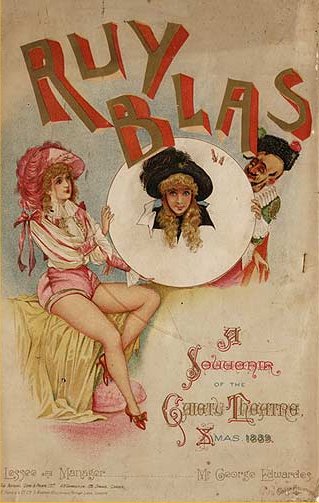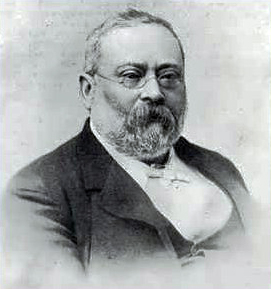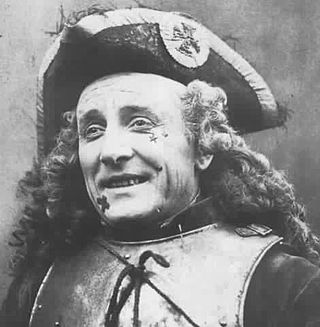Life and career
He was born in Harley Street, London, the son of a clergyman. He was educated at Eton and the London Academy of Music. In 1877 he was appointed to a civil service post in the Lord Chancellor's office, composing music in his spare time. [1]
Reeve's operetta A Private Wire (1883) ran for more than nine months at the Savoy Theatre as a Curtain raiser to Iolanthe . The same year, he wrote Love & Music, a book of poetry. [2] He later composed the music for "Ruddy George, or Robin Redbreast", at Toole's Theatre (1887; a burlesque of Gilbert and Sullivan's Ruddigore ) to a libretto by H. G. F. Taylor. [3] In 1888, Reeve wrote about his old school in "An Eton Half Holiday". [4] His operetta The Crusader and the Craven (1890), with words by W. Allison, had a long run at the Globe Theatre (opening as an afterpiece to an operatic adaptation of The Black Rover) due to its "bright and taking music", [5] despite a libretto described by a later critic as "almost heroically banal", with lines such as, "I am a fierce crusader, a terror to each foe, to infidel invader, I carry death and woe". [6] He contributed to Cupid & Co. in 1894. [7] Reeve also wrote music for burlesques at the Gaiety Theatre and incidental music for West End plays, as well as serious chamber works, and songs to texts by a wide range of authors, from Théophile Gautier to E. Nesbit to Henry Pottinger Stephens. [1] [8]
Reeve was also a prolific musical journalist, contributing to a wide range of publications including Punch , The Saturday Review and The Daily Telegraph . [1] In 1896 he was appointed editor of The Lute, a music magazine. After Reeve's death, Lord Northcliffe recalled him in The Musical Times : "He was on my staff for a time, as musical critic; sensitive little man, with beautiful hands – irritable!" [9]
As a fluent French speaker, he was responsible for the English translation used by F. C. Burnand, and the lyrics, for Edmond Audran's Miss Helyett (1890), staged successfully in London as Miss Decima in 1891. [1]

Frederick George Hobson, known as Fred Leslie, was an English actor, singer, comedian and dramatist.

Henry Louis Reginald De Koven was an American music critic and prolific composer, particularly of comic operas.

Thespis, or The Gods Grown Old, is an operatic extravaganza that was the first collaboration between dramatist W. S. Gilbert and composer Arthur Sullivan. No musical score of Thespis was ever published, and most of the music has been lost. Gilbert and Sullivan went on to become the most famous and successful artistic partnership in Victorian England, creating a string of enduring comic opera hits, including H.M.S. Pinafore, The Pirates of Penzance and The Mikado.

Sir Francis Cowley Burnand, usually known as F. C. Burnand, was an English comic writer and prolific playwright, best known today as the librettist of Arthur Sullivan's opera Cox and Box.

The German Reed Entertainments were founded in 1855 and operated by Thomas German Reed (1817–1888) together with his wife, Priscilla German Reed (1818–1895). At a time when the theatre in London was seen as a disreputable place, the German Reed family provided family-friendly entertainments for forty years, showing that respectable theatre could be popular.

The Gaiety Theatre was a West End theatre in London, located on Aldwych at the eastern end of the Strand. The theatre was first established as the Strand Musick Hall in 1864 on the former site of the Lyceum Theatre. In 1868, it became known as the Gaiety Theatre and was, at first, known for music hall and then for musical burlesque, pantomime and operetta performances. From 1868 to the 1890s, it had a major influence on the development of modern musical comedy.

Basil Willett Charles Hood was a British dramatist and lyricist, perhaps best known for writing the libretti of half a dozen Savoy Operas and for his English adaptations of operettas, including The Merry Widow.

Ruy Blas and the Blasé Roué is a burlesque written by A. C. Torr and Herbert F. Clark with music by Meyer Lutz. It is based on the Victor Hugo drama Ruy Blas. The piece was produced by George Edwardes. As with many of the Gaiety burlesques, the title is a pun.

Wilhelm Meyer Lutz was a German-born British composer and conductor who is best known for light music, musical theatre and burlesques of well-known works.

Sir William Schwenck Gilbert was an English dramatist, librettist, poet and illustrator best known for his collaboration with composer Arthur Sullivan, which produced fourteen comic operas. The most famous of these include H.M.S. Pinafore, The Pirates of Penzance and one of the most frequently performed works in the history of musical theatre, The Mikado. The popularity of these works was supported for over a century by year-round performances of them, in Britain and abroad, by the repertory company that Gilbert, Sullivan and their producer Richard D'Oyly Carte founded, the D'Oyly Carte Opera Company. These Savoy operas are still frequently performed in the English-speaking world and beyond.

Galatea, or Pygmalion Re-Versed is a musical burlesque that parodies the Pygmalion legend, and specifically W. S. Gilbert's 1871 play Pygmalion and Galatea. The libretto was written by Henry Pottinger Stephens and W. Webster. The score was composed by Wilhelm Meyer Lutz.

Faust up to Date is a musical burlesque with a libretto was written by G. R. Sims and Henry Pettitt, and a score written by Meyer Lutz. Set in Nuremberg, it is a spoof of Gounod's opera, Faust, which had first been performed in London in 1864. The burlesque followed on from an earlier Lutz musical, Mephistopheles, or Faust and Marguerite.

Albert Ernest Alsor Clair Ford was an English composer of operas and ballet music and a conductor.

John Hollingshead was an English theatrical impresario, journalist and writer during the latter half of the 19th century. After a journalism career, Hollingshead managed the Alhambra Theatre and was later the first manager of the Gaiety Theatre, London. Hollingshead also wrote several books during his life.

Carmen up to Data is a musical burlesque with a score written by Meyer Lutz. Set in Seville, the piece was a spoof of Bizet's 1875 opera Carmen. The libretto was written by G. R. Sims and Henry Pettitt.

Frank Wyatt was an English actor, singer, theatre manager and playwright.

Frederick John D'Auban was an English dancer, choreographer and actor of the Victorian and Edwardian eras. Famous during his lifetime as the ballet-master at the Theatre Royal, Drury Lane, he is best remembered as the choreographer of many of the Gilbert and Sullivan operas.
Miss Esmeralda is a Victorian burlesque, in two acts, with music by Meyer Lutz and Robert Martin and a libretto by Fred Leslie, under his pseudonym "A. C. Torr", and Horace Mills. It is based on Victor Hugo's 1831 novel The Hunchback of Notre-Dame.

Monte Cristo Jr. was a Victorian burlesque with a libretto written by Richard Henry, a pseudonym for the writers Richard Butler and Henry Chance Newton. The score was composed by Meyer Lutz, Ivan Caryll, Hamilton Clarke, Tito Mattei, G. W. Hunt and Henry J. Leslie. The ballet and incidental dances were arranged by John D'Auban, and the theatre's musical director, Meyer Lutz, conducted. The play's doggerel verse was loosely based on The Count of Monte Cristo by Alexandre Dumas.

The Bohemian G-yurl and the Unapproachable Pole is a musical burlesque in two acts, with a score by Meyer Lutz to a libretto by Henry James Byron, which played under the management of John Hollingshead at the Gaiety Theatre in London in 1877. It was a parody of the popular opera The Bohemian Girl composed by Michael William Balfe with a libretto by Alfred Bunn.



















